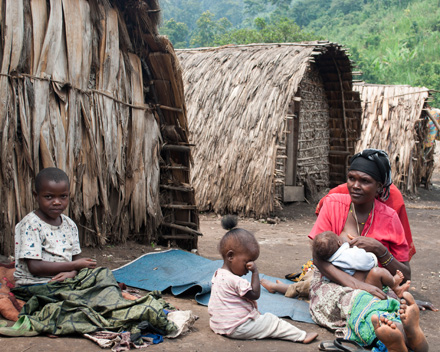
The murder and mayhem in one of the world’s most godforsaken countries has triggered a significant initiative this month by the Irish Jesuit Mission Office. It is linking up with all the mission offices of Europe in a joint effort to meet the challenging chaos of the Congo.
 Despite its huge natural richness (lands, minerals, gold, stain, oil, coltan,) DRC is listed by UNDP 2011 Human Development Index as the world’s poorest country. Countless local and foreign rebel groups – not helped by the greed of Western colonists – have destabilized the eastern province of Kivu Nord, the richest of the country’s provinces. Kivu has lived in a social, political, economic and humanitarian crisis that grows year after year, under a plague of regional, national and local armed gangs.
Despite its huge natural richness (lands, minerals, gold, stain, oil, coltan,) DRC is listed by UNDP 2011 Human Development Index as the world’s poorest country. Countless local and foreign rebel groups – not helped by the greed of Western colonists – have destabilized the eastern province of Kivu Nord, the richest of the country’s provinces. Kivu has lived in a social, political, economic and humanitarian crisis that grows year after year, under a plague of regional, national and local armed gangs.
It is estimated that half a million people have been displaced by a violent rebellion since April 2012. On November 20th, a group called M23 attacked and captured the cities of Goma and Sake, and a further 130,000 people fled their homes, Of these about 11,000 are estimated to be teenagers. The M23 group have been recently classified as terrorists by the international community, and it is strongly suspected that they are being supported by the Rwanda government – which denies involvement. About two weeks after the attack, M23 (named after a date in March when they banded together) retreated from the towns according to a peace agreement negotiated in Kampala, Uganda. During the occupation, the terrorists had occupied and severely damaged the schools and burned the desks and furniture for fuel.
In face of this emergency, the Jesuit Refugee Service (JRS), who have been already operative in this area, focussed their interventions on education, and particularly on second-level education in the Goma area. The danger of the 11,000 displaced and deschooled teenagers being drafted into the army and rebel gangs was a major consideration. In fact it is already happening, but it is hoped that enabling the children to attend school will reduce the incidence of this considerably. Other agencies, including the UNHCR, are to concentrate on basic supplies of food and accommodation. Initial assessments by JRS, who are the only agency working at second level education in the area, listed 12 secondary schools for refurbishment of classrooms, toilets, and furniture. School kits for all these pupils and also for extra teachers are also being sought, with an initial budget of €38,000 for this first phase of the project.
JRS appealed to the Xavier Network for aid. The Xavier Network is the coordinated network of all the European mission offices and NGOs. This group, originally consisting of the Jesuit NGOs in the provinces, now includes all the mission offices of Europe. This is the first time that the Irish Mission Office will be contributing to an emergency as part of the Xavier Network. The response is being coordinated by ALBOAN, the NGO of Loyola Province based in Bilbao, and will be overseen by the Regional Director of JRS Great Lakes, Fr. Isaac Kibaka SJ from Uganda.
Martin Curry SJ, Programmes Officer of the Mission Office, applied to Misean Cara for support from their Emergency Funds, and the maximum grant of €15,000 has been approved. This will be used to rehabilitate 2 classrooms out of the 10 classes in the first phase of the project. School kits will also be provided for 2,000 second-level pupils and for 100 teachers. Other funds are being provided by Entreculturas (Madrid), the Austrian Mission Office (Vienna), Magis Italy, Jesuit Missions in London, and Jesuitenmission in Nuremberg. Further funds will be sought when the initial phase is completed, as the situation in eastern DRC looks like being unstable for many months to come. If the peace negotiations in Kampala are not fully successful, M23 has threatened to re-take the cities and towns of the North Kivu area.
Taken from www.jesuit.ie

